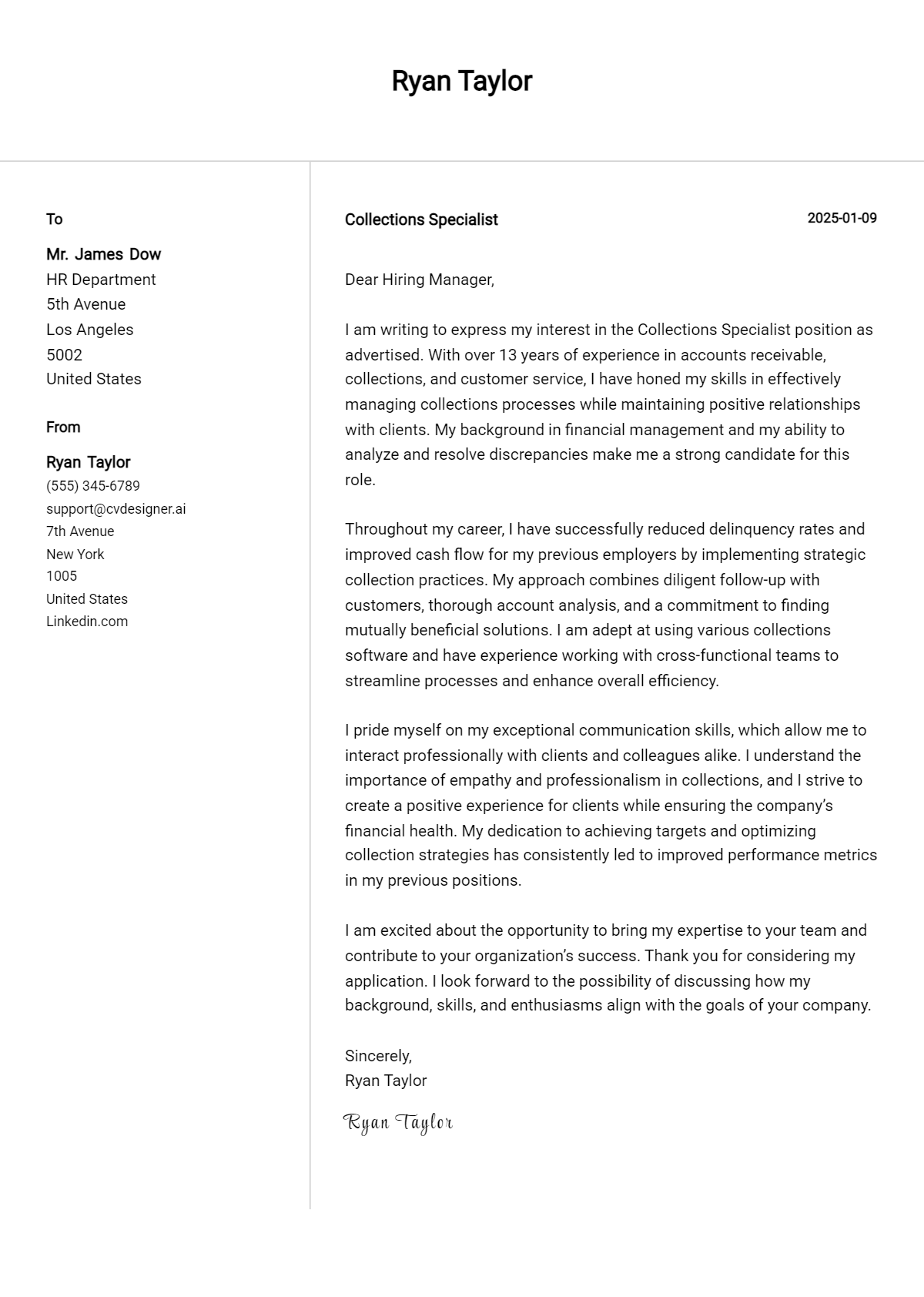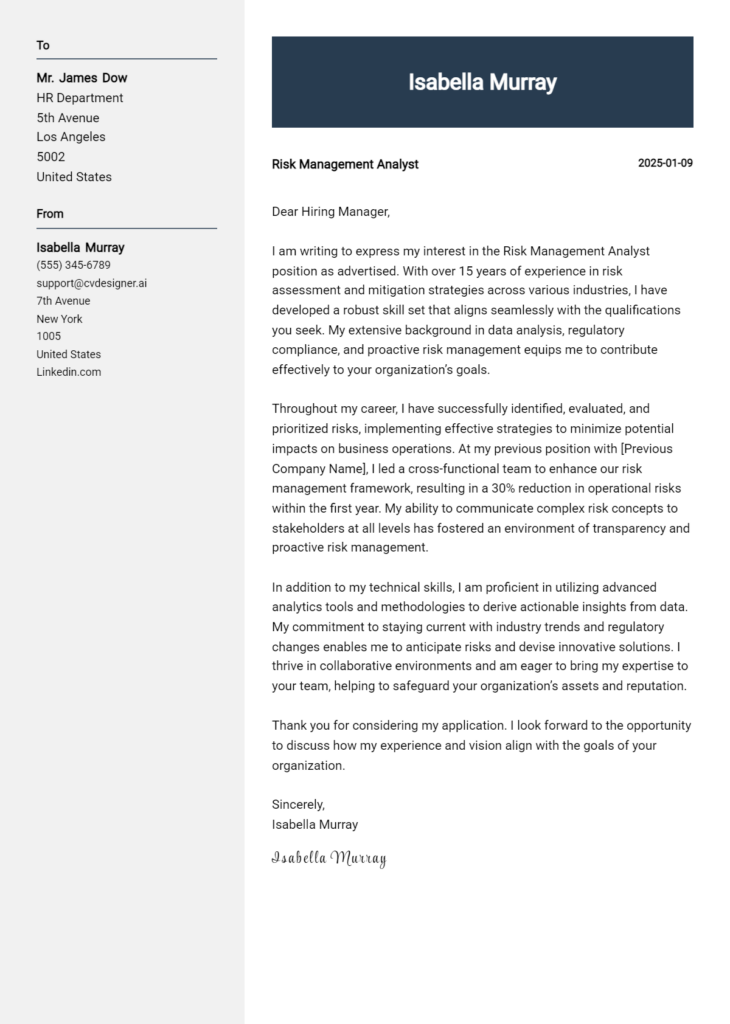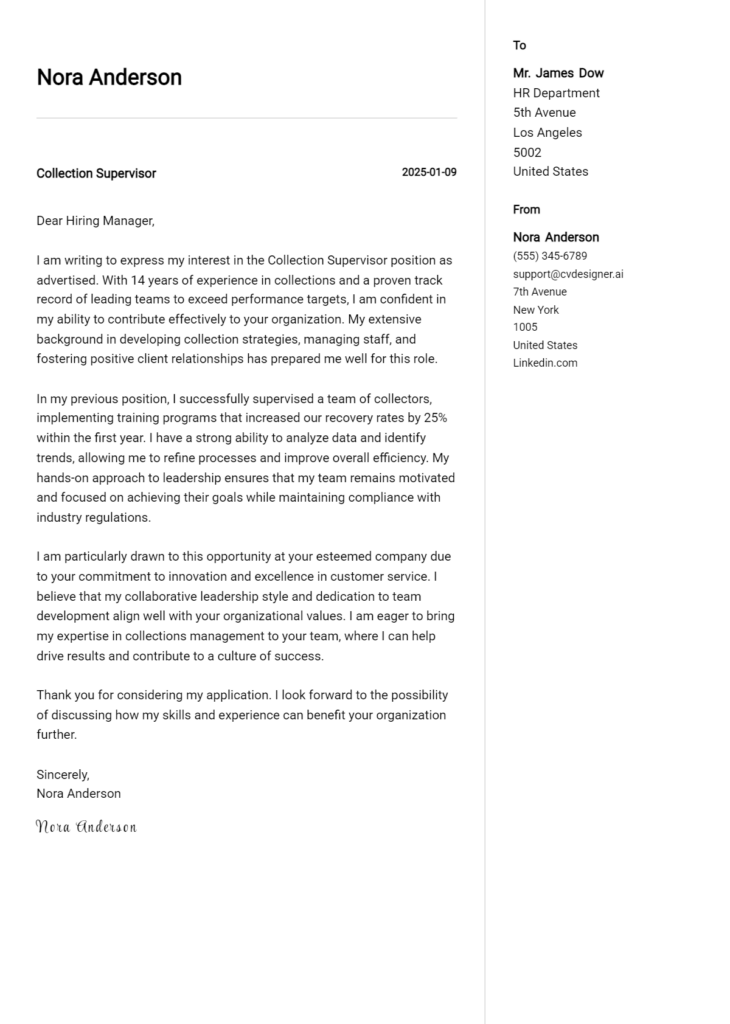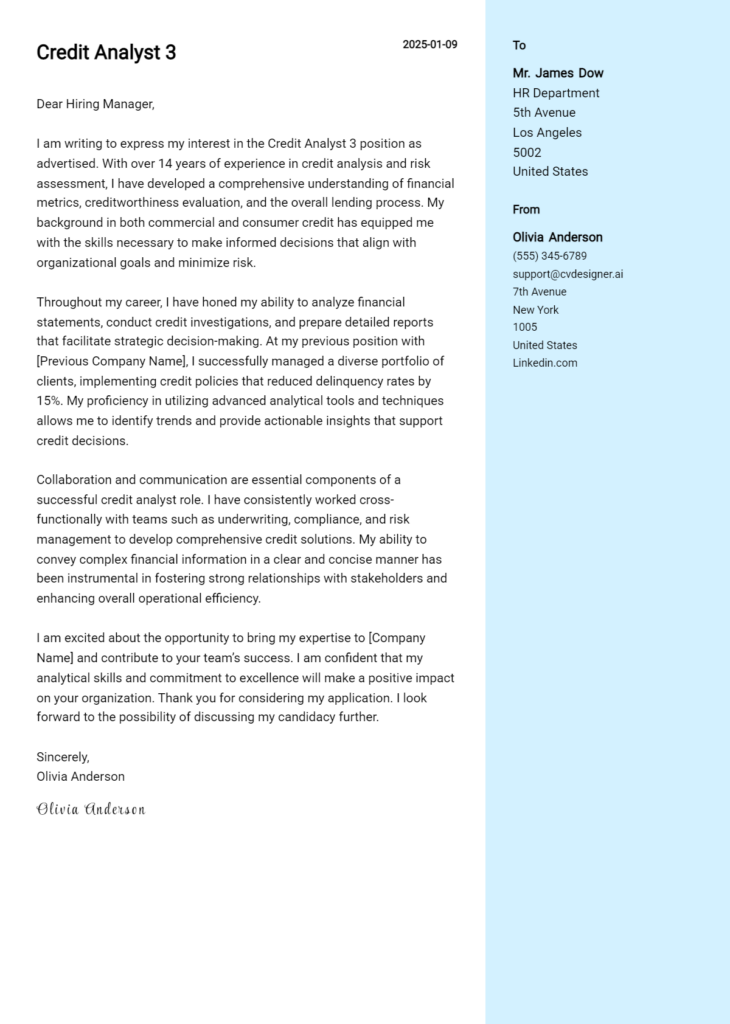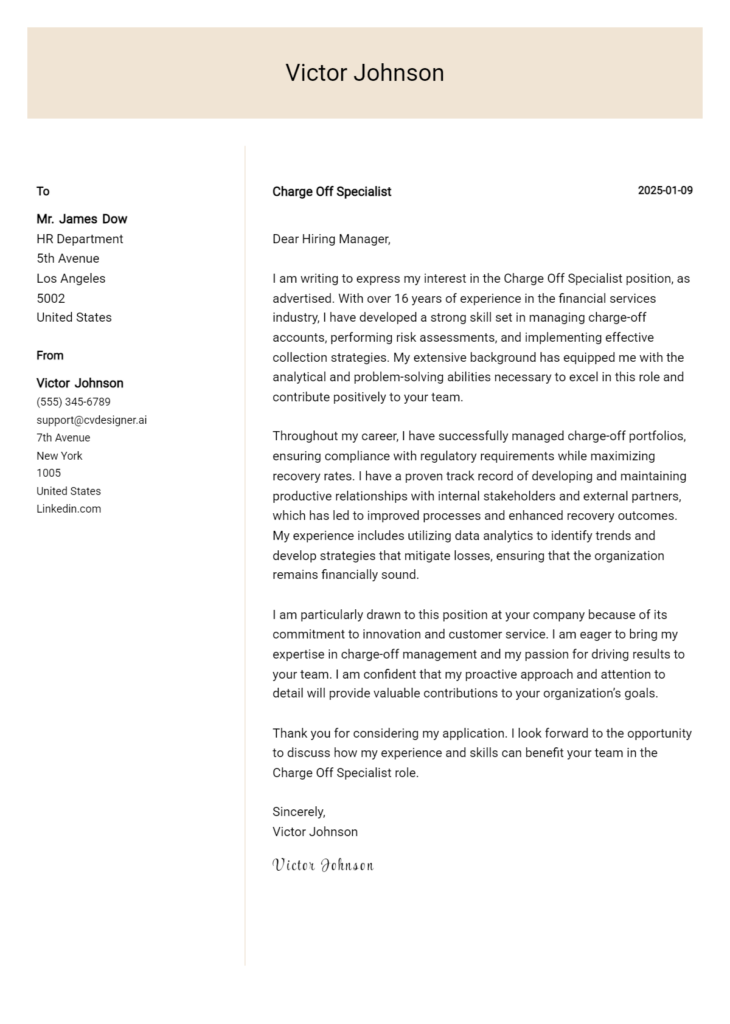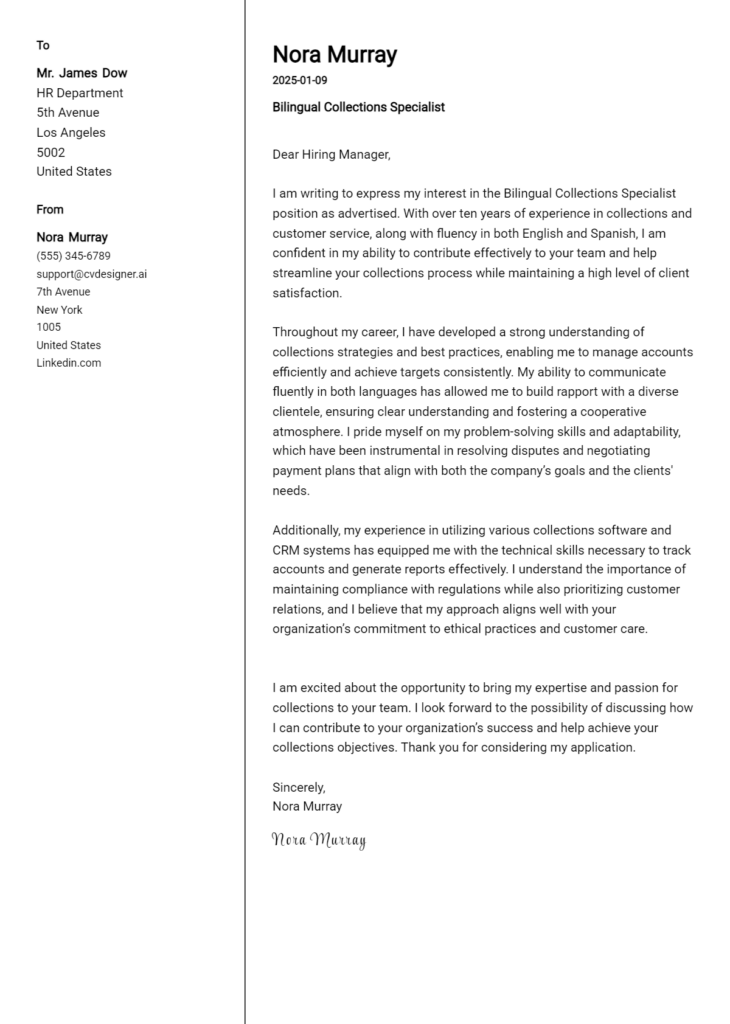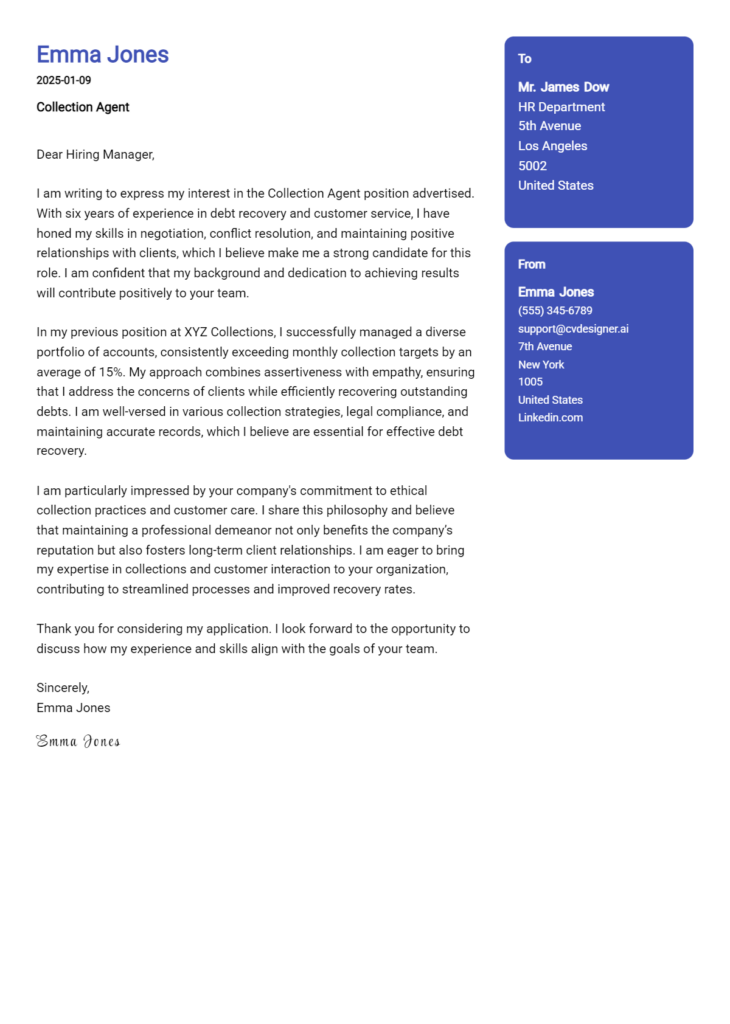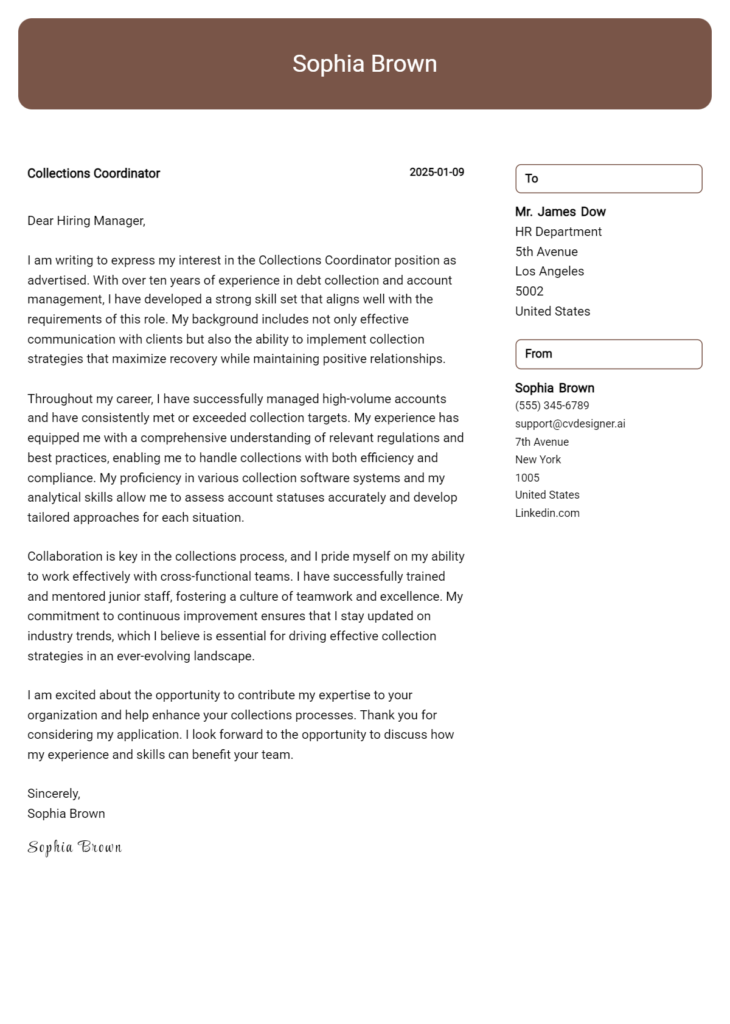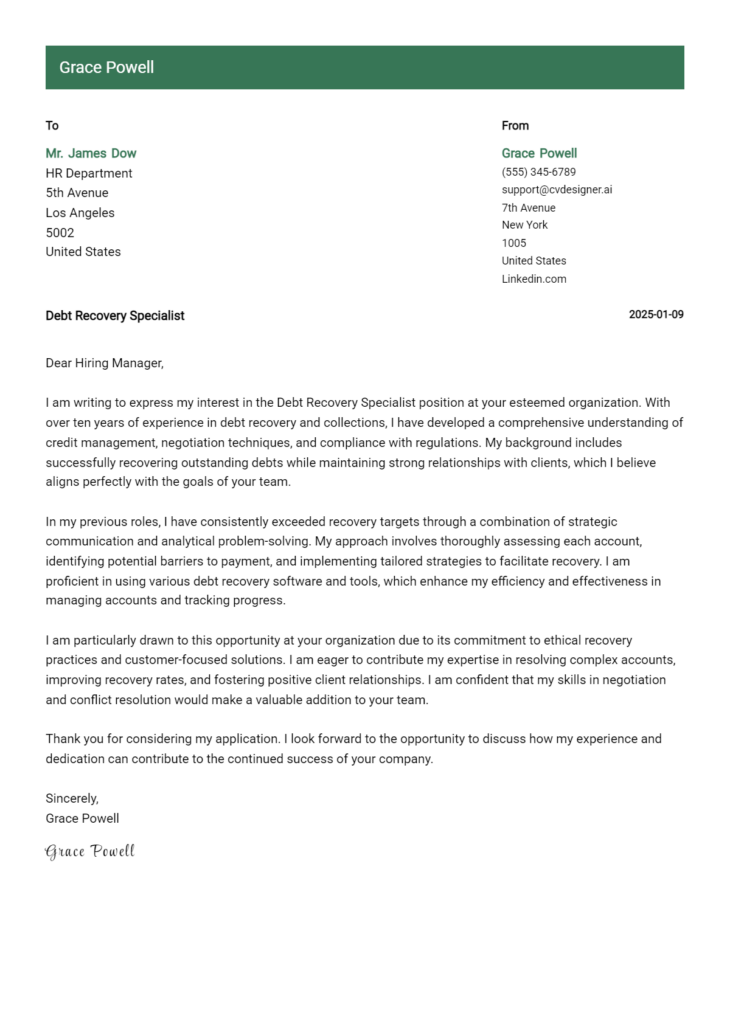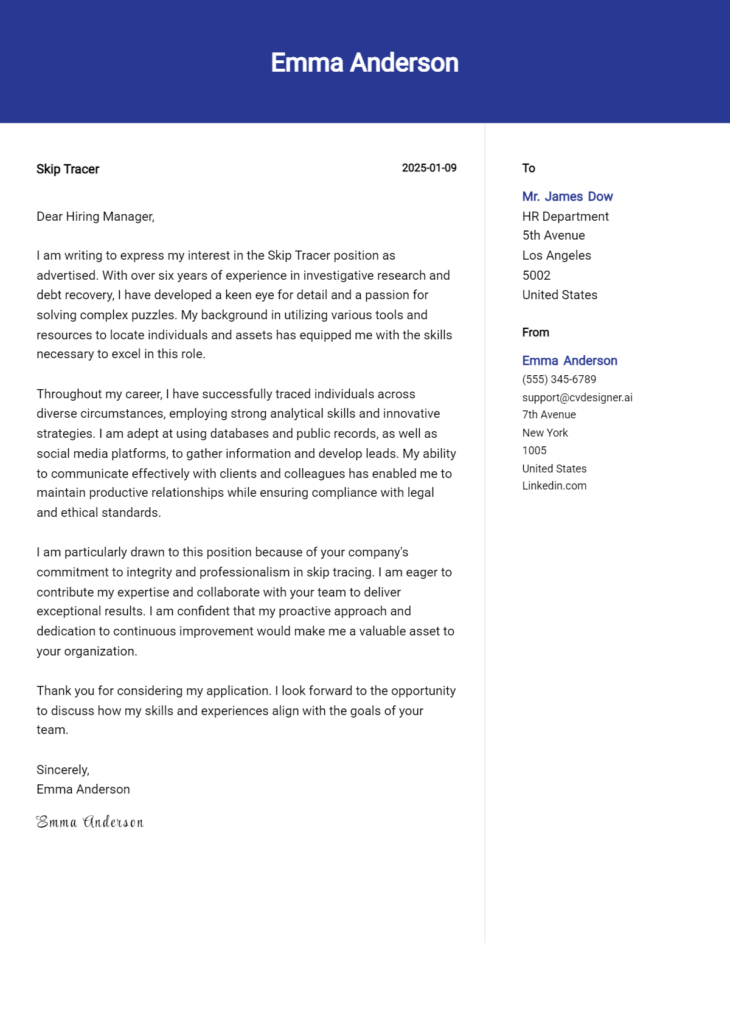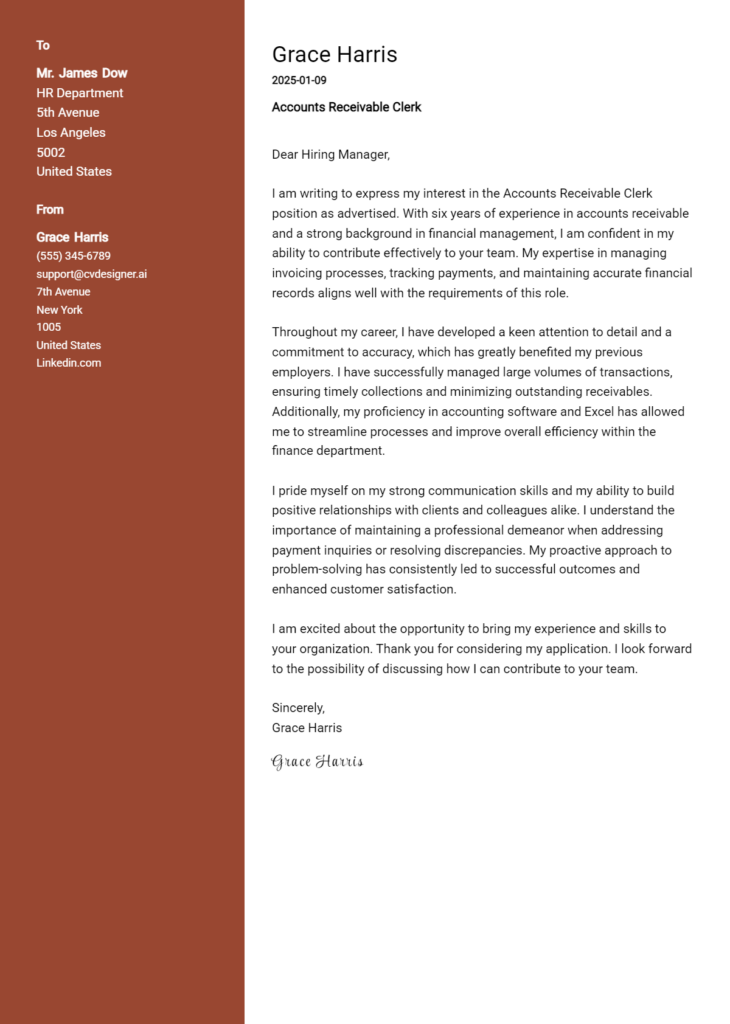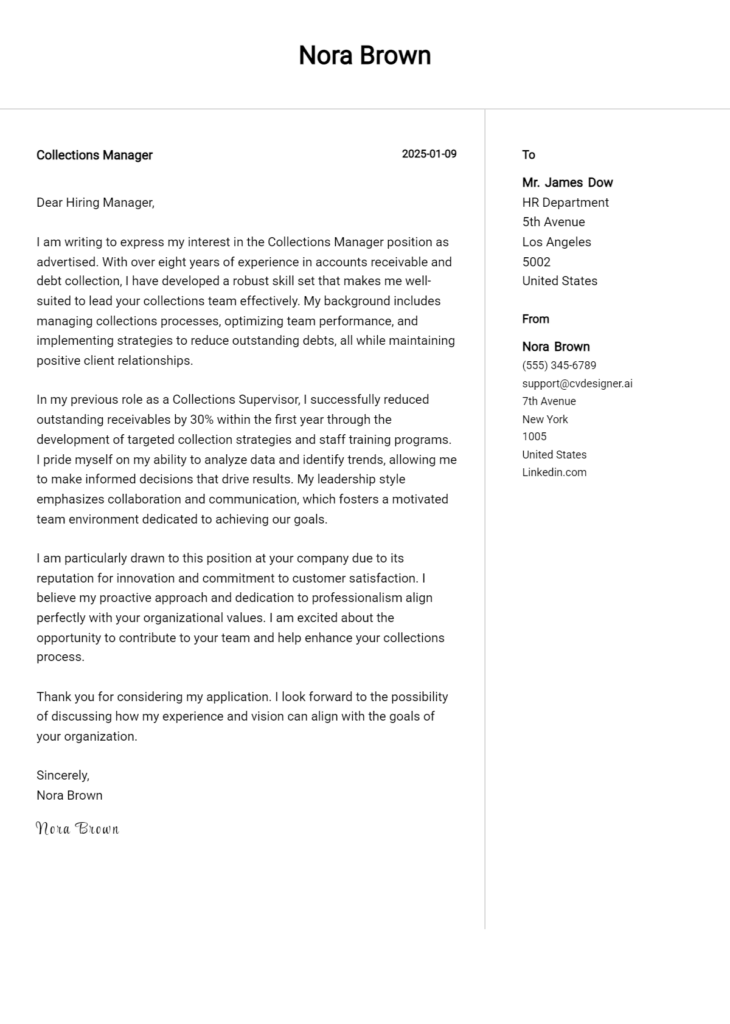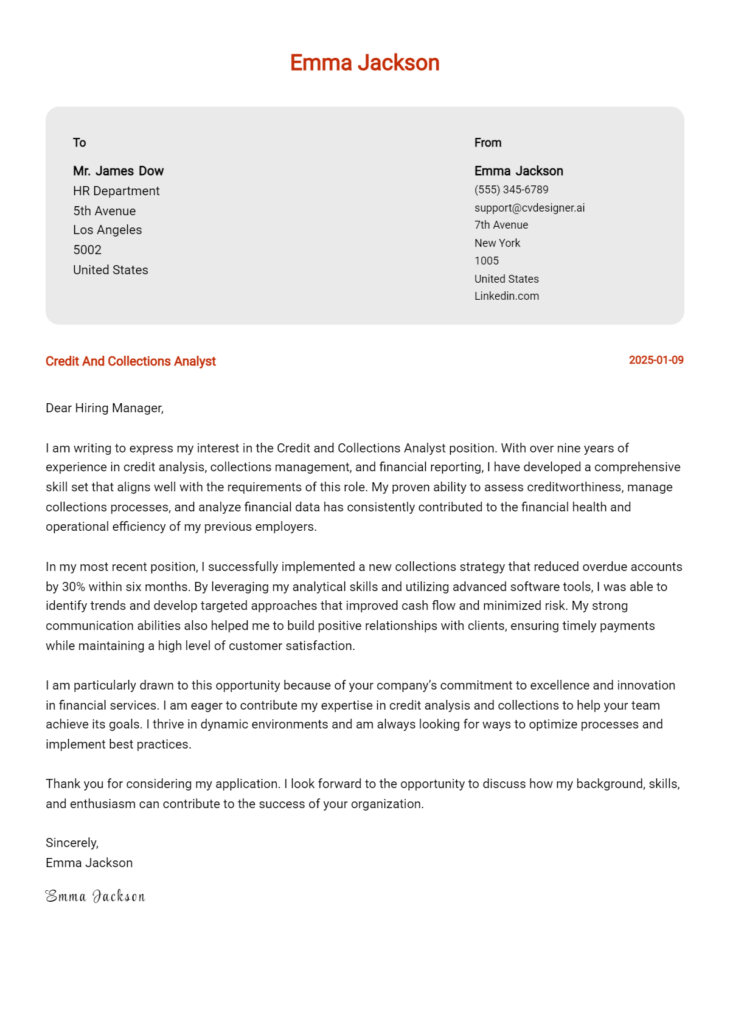Collections Specialist Cover Letter Examples
Explore additional Collections Specialist cover letter samples and guides and see what works for your level of experience or role.
How to Format a Collections Specialist Cover Letter?
Crafting a compelling cover letter is essential for a Collections Specialist, as it not only highlights your qualifications but also demonstrates your ability to communicate effectively and professionally. The way you format your cover letter can significantly influence a hiring manager's perception of your organizational skills and attention to detail—crucial traits when managing sensitive financial information and customer relationships.
In this guide, we will outline how to properly structure your cover letter, providing insights and examples tailored specifically for the Collections Specialist role.
We will focus on the essential components of a professional cover letter, including:
- Cover Letter Header
- Cover Letter Greeting
- Cover Letter Introduction
- Cover Letter Body
- Cover Letter Closing
Each section is vital for showcasing your qualifications and professionalism. Let’s break down each part to help you craft a standout cover letter for your Collections Specialist application.
The Importance of a Cover Letter Header for a Collections Specialist
A well-structured cover letter header is crucial for a Collections Specialist as it establishes professionalism and provides essential information at a glance. The header should clearly include your contact information, the date of writing, and the recipient's details, ensuring that the hiring manager can easily reach you. Clarity is key; a well-organized header reflects your attention to detail, a quality highly valued in collections work. Below are examples of a strong and weak cover letter header for a Collections Specialist.
Strong Example:
John Doe 123 Main Street Cityville, ST 12345 (123) 456-7890 john.doe@email.com October 1, 2023 Jane Smith Hiring Manager XYZ Collections Agency 456 Elm Street Cityville, ST 12345
Weak Example:
johndoe@email.com 10/1/23 Hey, I’m applying for the job.
The Importance of the Cover Letter Greeting
The cover letter greeting is crucial as it sets the tone for the entire letter and serves as the first point of contact with the hiring manager. A well-crafted greeting demonstrates your professionalism and shows that you have taken the time to personalize your application. Addressing the hiring manager directly not only establishes a connection but also reflects your attention to detail and genuine interest in the position. To avoid generic greetings that can come off as impersonal, it’s advisable to do some research to find the recipient's name. This effort can significantly enhance the impact of your introduction.
Strong Greeting Example:
Dear Ms. Johnson,
Weak Greeting Example:
To Whom It May Concern,
The Importance of a Well-Crafted Cover Letter Introduction for a Collections Specialist
A well-crafted cover letter introduction is crucial for a Collections Specialist, as it serves as the first impression to the hiring manager. This opening paragraph should capture their attention, express genuine interest in the position, and briefly showcase relevant skills or achievements that align with the job requirements. A strong introduction creates a compelling narrative that encourages the reader to delve deeper into the candidate’s qualifications, while a weak introduction may fail to engage or convey the necessary enthusiasm and expertise required for the role.
Strong Example
Dear [Hiring Manager's Name], I am excited to apply for the Collections Specialist position at [Company Name], as I have a strong passion for maintaining positive client relationships while ensuring timely collections. With over five years of experience in accounts receivable and a proven track record of reducing overdue accounts by 30%, I believe my skills in negotiation and problem-solving make me a perfect fit for your team. I am eager to bring my expertise to [Company Name] and help enhance your collections process.
Weak Example
To whom it may concern, I am writing to apply for the Collections Specialist job. I have some experience in collections, and I think I could do this job. I have worked in customer service before, and I think that’s important. I hope you consider my application.
Purpose of the Cover Letter Body for a Collections Specialist
The cover letter body for a Collections Specialist is crucial as it serves to articulate the candidate's relevant skills, experiences, and the unique value they bring to the organization. This section allows the candidate to highlight specific projects or accomplishments that demonstrate their proficiency in debt recovery, negotiation, and customer relations. By providing concrete examples, the candidate can effectively showcase their ability to improve collection rates, resolve disputes, and maintain positive client relationships, ultimately reflecting their potential contribution to the company’s financial health and customer satisfaction.
Strong Example
In my previous position at XYZ Collections, I successfully led a project to streamline our debt recovery process, resulting in a 30% increase in collections within six months. By implementing a new tracking system and training my team on effective negotiation techniques, we were able to reduce the average days delinquent from 45 to 30 days. My dedication to maintaining positive customer relationships helped retain key accounts, further boosting our revenue. I am confident that my strategic approach and proven track record in enhancing collection efficiencies will add significant value to your team.
Weak Example
I have worked in collections for a few years and have some experience. In my last job, I contacted customers to collect payments. I think I am good at my job, and I want to work for your company because I need a job. I hope to do well in collections and help your company.
Importance of the Cover Letter Closing for a Collections Specialist
The closing paragraph of a cover letter is crucial for leaving a lasting impression on potential employers, particularly for a Collections Specialist. This section should succinctly summarize your qualifications, reaffirm your interest in the position, and prompt the hiring manager to take the next steps, such as reviewing your resume or scheduling an interview. A strong closing not only reinforces your fit for the role but also demonstrates your enthusiasm and professionalism, while a weak closing may come off as indifferent or unmotivated.
Strong Example
Thank you for considering my application for the Collections Specialist position. With over five years of experience in accounts receivable and a proven track record of successfully reducing overdue accounts, I am excited about the opportunity to contribute to your team. I am eager to bring my expertise in negotiation and customer relations to your esteemed company. I look forward to discussing my application in more detail and hope to schedule an interview soon. Please feel free to contact me at your earliest convenience.
Weak Example
I think I would be a decent fit for the Collections Specialist role. I have some experience in collections. I hope you look at my resume. Thank you.
When applying for a Collections Specialist position, crafting a compelling cover letter can significantly enhance your chances of making a positive impression on potential employers. This document should effectively showcase your technical skills, problem-solving abilities, knowledge of the software development life cycle (SDLC), teamwork, and a genuine passion for continuous learning. The following tips will guide you in creating an impactful cover letter that highlights these essential qualities.
Cover Letter Writing Tips for Collections Specialist
Highlight Technical Skills: Make sure to emphasize any relevant technical skills that are essential for a Collections Specialist role. This can include proficiency in collections software, data analysis tools, or accounting systems. Use specific examples from your previous experience to demonstrate how these skills have contributed to successful collections efforts.
Showcase Problem-Solving Abilities: Employers value candidates who can think critically and resolve issues efficiently. In your cover letter, share instances where you successfully navigated challenging situations, such as negotiating payment plans or resolving disputes with clients. Highlighting your ability to analyze problems and implement effective solutions will set you apart.
Demonstrate SDLC Knowledge: If applicable, mention your understanding of the software development life cycle (SDLC) and how it relates to collections processes. Discuss any experience you have in collaborating with software teams to improve collections systems or processes, as this shows your ability to bridge finance and technology effectively.
Emphasize Teamwork: Collections often involve collaboration with various departments, such as sales and customer service. Discuss your experience working in teams and how you contributed to achieving common goals. Providing examples of successful teamwork can illustrate your ability to work harmoniously within a company’s ecosystem.
Express Passion for Continuous Learning: The field of collections is constantly evolving, so it's important to convey your commitment to staying updated with industry trends and enhancing your skills. Mention any relevant training or certifications you have pursued, or express your enthusiasm for attending workshops and seminars. This demonstrates a proactive attitude towards professional growth.
By incorporating these tips into your cover letter, you can effectively convey your qualifications for the Collections Specialist role. If you need further assistance, consider using our cover letter templates or our cover letter builder to help structure your document professionally.
Common Mistakes to Avoid in a Collections Specialist Cover Letter
Crafting a compelling cover letter is essential for standing out as a Collections Specialist. Avoiding common mistakes can significantly enhance your chances of making a positive impression on hiring managers. Here are some frequent pitfalls to watch out for:
- Generic Content: Using a one-size-fits-all approach can hurt your application. Tailor your letter for each job by researching the company and incorporating specific details about the position.
- Ignoring the Format: A poorly formatted cover letter can be off-putting. Ensure you follow a clear cover letter format to maintain professionalism and readability.
- Focusing on Duties Instead of Achievements: Simply listing job responsibilities does not showcase your value. Highlight your accomplishments with quantifiable results to demonstrate your effectiveness.
- Neglecting Proofreading: Typos and grammatical errors can undermine your professionalism. Take the time to proofread your letter or have someone else review it to ensure clarity and correctness.
- Being Too Formal or Informal: Striking the right tone is crucial. Find a balance between professionalism and approachability that matches the company's culture.
- Lack of Specificity: Vague statements can weaken your application. Be specific about your skills and how they relate to the role of a Collections Specialist.
- Failing to Show Enthusiasm: A lack of passion for the role can be a red flag. Convey genuine interest in the position and the company to make your application stand out.
For more insights on crafting an effective cover letter, check out these cover letter examples.
Cover Letter FAQs for Collections Specialist
What should I include in my cover letter for a Collections Specialist position?
When crafting your cover letter for a Collections Specialist role, focus on highlighting relevant skills and experiences. Begin with a brief introduction that includes the position you're applying for and where you found the job listing. In the body, emphasize your experience in debt collection, customer service, and negotiation skills. Include specific examples that demonstrate your ability to manage accounts, resolve disputes, and meet collection goals. Additionally, mention any relevant certifications, such as from the ACA International. Conclude with a strong closing statement expressing your enthusiasm for the role and your desire to contribute to the company’s financial success.
How can I demonstrate my skills and experience in the cover letter?
To effectively showcase your skills and experience in your cover letter, use specific examples from your previous roles. Highlight your proficiency in using collection software, your understanding of credit regulations, and any metrics that reflect your success in collections. For instance, mention instances where you successfully reduced outstanding debt or improved the collection rate. Additionally, discuss your communication skills, emphasizing how you handle difficult conversations with clients while maintaining professionalism. Using quantitative data will add credibility to your claims and make your application stand out.
Should I address my cover letter to a specific person?
Whenever possible, it’s best to address your cover letter to a specific person, such as the hiring manager or recruiter. This shows that you have done your research and are genuinely interested in the position. You can often find this information on the company’s website, LinkedIn, or by calling the company directly. If you cannot find a specific name, addressing it to the hiring team is acceptable. Avoid generic salutations like "To Whom It May Concern," as they may come off as impersonal. A personalized greeting can create a positive first impression.
How long should my cover letter be?
Your cover letter should ideally be one page long, consisting of three to four paragraphs. Aim for a concise yet impactful format that allows you to present your qualifications without overwhelming the reader. Keep each paragraph focused: introduce yourself and your intent in the first, elaborate on your relevant experience and skills in the second, and conclude with a strong closing statement expressing your enthusiasm for the position. Remember, hiring managers often review numerous applications, so clarity and brevity are key to ensuring your cover letter is read and remembered.
Build your Cover Letter in minutes
Use an AI-powered cover letter builder and have your letter done in 5 minutes. Just select your template and our software will guide you through the process.

